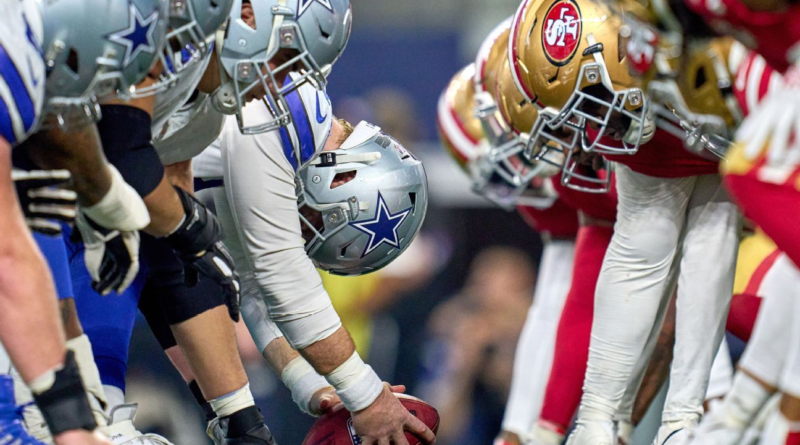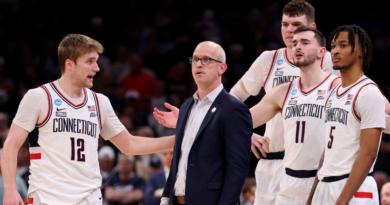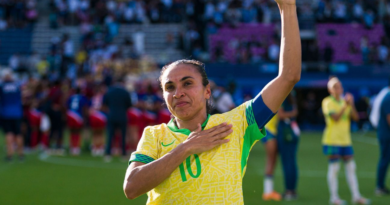From playoff clashes to prime-time showdowns: Key Cowboys-49ers moments
The Dallas Cowboys and San Francisco 49ers will renew their longstanding rivalry under the bright lights of Levi’s Stadium on “Sunday Night Football.”
San Francisco leads the all-time series against Dallas 20-19-1, including playoffs, and has won the past three meetings. A win would give the 49ers their longest win streak against the Cowboys since winning six straight from 1981-1990.
This is the second consecutive season the teams will meet in prime time (49ers won 42-10 last season) and the fifth prime-time matchup since the 1970 merger, with the 49ers winning three of the previous four. They’ve also eliminated Mike McCarthy’s Cowboys in the 2021 wild-card and 2022 divisional rounds of the playoffs.
Read more: Cowboys-49ers rivalry is undergoing a renaissance
Niners coach Kyle Shanahan has plenty of memories of Cowboys-49ers meetings as his father, Mike Shanahan, worked as the Niners offensive coordinator in those 1992 to 1994 contests. He believes the recent contests between the teams has reignited the rivalry.
“Anytime you play each other in the playoffs, it’s always usually a bit bigger the next year,” Shanahan said. “And with that being back-to-back, it was huge. That’s what I always remembered growing up. … They played in the NFC Championship all three years that I lived here. So just playing them in the playoffs two years ago kind of was reminiscent of that. … Those histories stack up.”
Dallas coach Mike McCarthy has also seen the rivalry up close from his time as Niners offensive coordinator in 2005. He’s called “The Catch” his first memory of it.
“You can only achieve one win out of this game,” McCarthy said. “We understand that. … We know who we’re playing, and we have a good understanding of how they want to play. That’s why you get to kick it off on ‘Sunday Night Football.'”
Here are some of the top moments that made 49ers-Cowboys one of the greatest nondivision rivalries in NFL history, selected by NFL Nation reporters Nick Wagoner and Todd Archer.
Rivalry renewed
Playoff heartbreak has become a trend for the Cowboys and 2021’s wild-card loss to the 49ers joined Tony Romo’s bobbled snap against Seattle in 2006 and Dez Bryant’s overturned catch against Green Bay in 2014.
With 14 seconds left, Dak Prescott had a 17-yard run to the San Francisco 24. Without a timeout, the Cowboys hurried to the line of scrimmage but the umpire collided with Prescott and center Tyler Biadasz and did not get the ball set for play.
The clock ran out and the Cowboys never got a chance for a potential game-winning touchdown, losing 23-17.
After the game, the Cowboys said they practiced that scenario each week, but they were unable to pull it off in time in game conditions.
Owner and general manager Jerry Jones was as disappointed and as irritated as he had been with any playoff loss. With a 12-5 record, NFC East title and a healthy roster, Jones believed the Cowboys were primed for a playoff run. Instead, he let coach Mike McCarthy twist in the wind for a couple of weeks while trying to keep defensive coordinator Dan Quinn from taking a head-coaching job elsewhere.
The 49ers went on a run, making it to the NFC Championship Game for the second time under Kyle Shanahan. Their season ended almost equally as heartbreaking, blowing a 17-7 fourth-quarter lead to the Los Angeles Rams.
Rivalry renewed, II
It was a different round of the playoffs — divisional, not wild card. It was at a different stadium — Levi’s Stadium, not AT&T Stadium. But the result was the same: Niners 19-12.
The difference in this one? Two Dak Prescott interceptions, including one inside San Francisco’s red zone in the second quarter with the score tied. Like they did after Prescott’s first turnover in the first quarter, the 49ers turned that giveaway into a field goal for a 9-6 lead.
One play before the interception, the Cowboys lost Pro Bowl running back Tony Pollard for the game because of a leg injury. From that moment on, the Dallas offense was stagnant. The San Francisco offense was marginally better, but it did not have any turnovers and a 30-yard catch by George Kittle from Brock Purdy ignited the only touchdown drive of the second half.
The Cowboys had a chance at a game-tying drive but they went three and out after taking over with 3:04 to play. They got the ball back again with 45 seconds left but failed to threaten, and their final play — with Ezekiel Elliott at center — was disastrous.
The final play that sends the @49ers to the NFC Championship! #NFLPlayoffs pic.twitter.com/Du5KruFQ3q
— NFL (@NFL) January 23, 2023
With the win, the Niners advanced to the NFC Championship Game against the Philadelphia Eagles, but their dreams were dashed when Purdy suffered an arm injury in the first quarter. His replacement, Josh Johnson, was knocked out of the game in the third quarter, forcing running back Christian McCaffrey to play quarterback. — Todd Archer
Introducing ‘Captain Comeback’
A separated shoulder kept Cowboys QB Roger Staubach sidelined for most of the 1972 season, but he solidified his status as “Captain Comeback” in the fourth quarter of the divisional round.
Craig Morton started the game at quarterback for Dallas but threw two interceptions and lost a fumble as San Francisco mounted a 21-6 lead in the second quarter.
“They were laughing at us. Making fun of us during the game,” said Dallas safety Charlie Waters. “They were really enjoying having the upper hand on us. They didn’t think there was any way [we’d come back] — because our offense was sputtering. We were doing absolutely nothing.”
The Cowboys’ offense was held scoreless in the third quarter, and coach Tom Landry made a QB change in the fourth.
Staubach fumbled the ball on his first possession but made up for his misstep by leading Dallas to a miraculous comeback. He threw two touchdown passes in the final two minutes, finding Billy Parks and Ron Sellers, and that gave Dallas a 30-28 lead.
Waters sealed the game by picking off 49ers QB John Brodie.
‘The Catch’
Joe Montana & Co. found themselves trailing the Cowboys 27-21 with less than five minutes remaining in the 1981 NFC Championship Game.
But Montana and Dwight Clark made magic happen on third down.
Montana evaded three defenders, rolled to his right and delivered the ball in the back of the end zone where Clark made the winning grab with 51 seconds remaining in regulation.
The play nearly didn’t happen, though.
“I was thinking of throwing the ball away,” Montana said after the game. “But I saw him come open and I figured if I could hang on another half-second …”
‘How ’bout them Cowboys?’
After finishing the regular season 13-3, Dallas steamrollered its NFC East rivals, the Philadelphia Eagles, 34-10 in the divisional round, stamping their ticket to meet the 49ers in the 1992 NFC Championship.
Meanwhile, San Francisco finished the season 14-2 and came out on top in a tough divisional-round matchup against Washington. Moreover, after winning four Super Bowls with Montana throughout the 1980s, the team looked to continue that stretch with Steve Young as its signal-caller.
Both squads were chock full of offensive talent with Young and Jerry Rice on one side and Troy Aikman, Emmitt Smith and Michael Irvin on the other.
Despite that, a low-scoring back-and-forth battle ensued in the first half, and the two were tied at 10 at halftime.
In the second half, Dallas scored three of the game’s final four touchdowns, which was enough to secure the victory and a Super Bowl XXVII appearance.
But before going to face the Buffalo Bills in the Super Bowl, Cowboys coach Jimmy Johnson had something to say:
“How ’bout them Cowboys?”
And just like that, a phrase that has transcended generations of Dallas fans was born.
‘We will win the ballgame, put it in 3-inch headlines’
In 1993, Johnson delivered another memorable phrase that has stood the test of time.
Before the two met for a second consecutive NFC Championship, Johnson called a local sports radio show and made an unprecedented declaration.
“We will win the ballgame,” Johnson stated. “You can put that in three-inch high headlines.”
Well, he wasn’t wrong.
Bolstered by a three-touchdown second quarter, Dallas dominated San Francisco 38-21 to advance to Super Bowl XXVIII.
Niners get their revenge
The Niners and Cowboys met for the NFC title for the third straight time, with both quarterbacks having opposing circumstances. Aikman entered with a 7-0 record as a starter in the playoffs, while Young had yet to get over the hump, and into the Super Bowl.
However, in 1994, the pendulum finally swung in favor of the 49ers.
Aikman threw a pick-six to Eric Davis on the first drive. Then Irvin fumbled on Dallas’ next possession, and Young took advantage of the ideal field position by connecting with Ricky Watters for a 29-yard touchdown. The Cowboys had another costly early turnover on the next drive when Kevin Williams fumbled the kickoff and San Francisco capitalized with a touchdown.
And just like that, the 49ers led 21-0 with over seven minutes left in the first quarter.
Still, Dallas put up a fight, recording 451 total yards of offense, compared to San Francisco’s 294, but couldn’t overcome five turnovers.
The 38-28 victory allowed Young to make his first Super Bowl appearance as the Niners’ starting quarterback.
Dallas wins ‘Deion Sweepstakes’
Entering the 1995 offseason, reigning Defensive Player of the Year and Super Bowl XXIX champion Deion Sanders was riding high after his best season. However, his one-year deal with San Francisco was up and it was time to find his next home.
The Miami Dolphins, New Orleans Saints, Oakland Raiders and Eagles entered the “Deion Sweepstakes” along with the Niners and Cowboys.
In Week 2, Dallas ended up signing Sanders to a seven-year, $35 million contract, which made him the NFL’s highest paid defensive player at the time.
Due to a surgery, Sanders was unable to make his debut for America’s Team until Week 9, but he made an immediate impact and went on to be a part of his second Super Bowl-winning squad in just as many years.
T.O.’s star-studded celebration
Terrell Owens’ legacy is highlighted by signature celebrations and unforgettable moments, and on Sept. 24, 2000, a star was born.
After making a 3-yard touchdown reception, Owens ran to midfield and spread his arms on the Cowboys’ logo. Nearly a minute later, longtime Dallas running back Emmitt Smith scored a touchdown of his own and responded by returning to the star to copy Owens. Later on, T.O. hauled in another touchdown and headed back to the center of the field in Texas Stadium, but Cowboys’ safety George Teague met him at the star and delivered a big hit.
On a 2016 episode of ESPN’s Mike & Mike radio show, Owens defended his decision to stand on the star.
“It had nothing to do with me trying to taunt my opponent, had nothing to do with me trying to taunt the Cowboys. … My coach was like, ‘Yo’ — he motivated me [to do this] — ‘This is what this is about. Go to the star, give your thanks to God, because he’s watching down on this game, and show him who’s the best player today.’ And that’s what I did.”
Tony Romo rallies past Niners in OT
In Week 2 of the 2011 season, Tony Romo managed to lead Dallas to an unlikely comeback win.
Romo took several hits in the first half, including one off of a blindside blitz that left him visibly in pain. He missed all but the last series in the third quarter, and his injuries were later revealed to be a broken rib and punctured lung. He would return in the fourth quarter.
The Cowboys trailed by as many as 10 points in the fourth, but the tide quickly changed.
Romo completed 5 of 6 passes on the drive that sent the game to overtime. His 77-yard pass to Jesse Holley set up the winning field goal. Romo connected on 20 of 33 passes for 345 yards and two touchdowns, with over 200 yards coming in the fourth quarter and OT.




